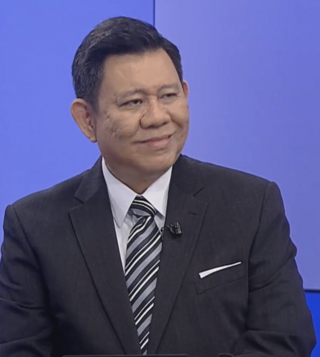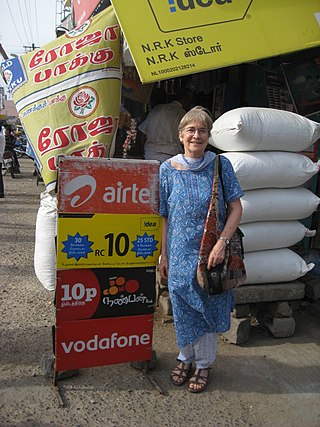External links
- ResearchGate Subrata K. Mitra
- Google Scholar Subrata K. Mitra
- ORCID Subrata K. Mitra
- The Rochester School: The Origins of Positive Political Theory, Annual Review of Political Science, 1999, 2, Ss.269-295
Subrata Kumar Mitra (born 16 June 1949 in Orissa, India, naturalized French) was director and research professor at the Institute for South Asian Studies at the National University of Singapore till May 20, 2018. Currently emeritus at the University of Heidelberg.
Subrata Mitra received a bachelor's degree in political science from Utkal University in Orissa, India. Subsequently, he obtained an M.A. in political science in 1971 based on a thesis on "The Role of the Bharatiya Kranti Dal in the Politics of Uttar Pradesh, 1967–1970" from the University of Delhi. After receiving an M.Phil degree in Political Development from Jawaharlal Nehru University in New Delhi, Mitra moved to the United States to the University of Rochester in Rochester, New York. He studied with William Riker and Bruce Bueno de Mesquita and received his doctorate in political science in 1976 based on his dissertation on "Ideological Structure, Strategy and Cabinet Stability: a theoretical and empirical exploration" directed by G. Bingham Powell.
Subrata Mitra is professor emeritus of political science of South Asia at the Faculty of Economic and Social Sciences of the University of Heidelberg. He was previously Head of the Department of Political Science at the South Asia Institute (University of Heidelberg) and was elected the South Asia Institute’s director for a term from 2002 to 2004. Professor Mitra previously taught at the University of Hull (England), University of Nottingham and University of California, Berkeley. He has also held appointments at the Indian Council for Social Science Research (New Delhi), as well as at the Institut Français d’Opinion Public (Paris). Professor Mitra is a visiting fellow at the Centre for the Study of Developing Societies (New Delhi) and from 2002 until 2006 he was the president of the joint Research Committee on Political Sociology of the International Political Science Association and the International Sociological Association. In 2004, Mitra was made Chevalier dans l'Ordre des Palmes Académiques for his commitment to promoting cultural exchange between France and Germany.
He is editor of the Heidelberg Papers in South Asian and Comparative Politics and a member of the editorial boards of the following publications: International Political Science Review , Journal of Commonwealth and Comparative Politics, India Review, International Journal of Hindu Studies , Contemporary South Asia, South Asia Research, Journal of South Asian Development. He is also the editor of the Advances in South Asian Studies series of Routledge.
Subrata Mitra's work deals with issues such as democratization in South Asia, the interaction of traditional values and modern institutions, the role of identity and religion in Indian politics, as well as the functioning of political parties and institutions in South Asia.

Indian nationalism is an instance of territorial nationalism, which is inclusive of all of the people of India, despite their diverse ethnic, linguistic and religious backgrounds. Indian nationalism can trace roots to pre-colonial India, but was fully developed during the Indian independence movement which campaigned for independence from British rule. Indian nationalism quickly rose to popularity in India through these united anti-colonial coalitions and movements. Independence movement figures like Mahatma Gandhi and Jawaharlal Nehru spearheaded the Indian nationalist movement. After Indian Independence, Nehru and his successors continued to campaign on Indian nationalism in face of border wars with both China and Pakistan. After the Indo-Pakistan War of 1971 and the Bangladesh Liberation War, Indian nationalism reached its post-independence peak. However by the 1980s, religious tensions reached a melting point and Indian nationalism sluggishly collapsed. Despite its decline and the rise of religious nationalism; Indian nationalism and its historic figures continue to strongly influence the politics of India and reflect an opposition to the sectarian strands of Hindu nationalism and Muslim nationalism.
B. S. Chimni is a legal scholar and academic who is presently distinguished professor of international law member at Jindal Global Law School. His areas of expertise include international law, international trade law and international refugee law. He has been chairperson of the Centre for International Legal Studies at Jawaharlal Nehru University, New Delhi. He had a 2+1⁄2-year stint as vice chancellor of the West Bengal National University of Juridical Sciences. He has been a visiting professor at the International Center for Comparative Law and Politics, Tokyo University, a Fulbright Visiting Scholar at Harvard Law School, visiting fellow at Max Planck Institute for Comparative Public Law and International Law, Heidelberg, and a visiting scholar at the Refugee Studies Center, York University, Canada.
S. N. Balagangadhara is a professor emeritus of the Ghent University in Belgium, and was director of the India Platform and the Research Centre Vergelijkende Cutuurwetenschap.
Pervaiz Iqbal Cheema was a Pakistani political scientist, cricketer, and a professor of International Relations and was last working as Dean, Faculty of Contemporary Studies, National Defence University, Islamabad - Pakistan.
Amrita Basu is an American academic and political scientist. She currently is a professor at Amherst College where she holds affiliations in the departments of Political Science, Sexuality, Women's, & Gender Studies, Asian Languages & Civilizations, and Black Studies.
Manfred G. Schmidt is professor of political science at the Faculty of Economic and Social Sciences of the University of Heidelberg.
Aurel Croissant is professor of political science at the Faculty of Economics and Social Sciences of the University of Heidelberg.
Gyanesh Kudaisya is a historian of modern South Asia whose main research focuses on the contemporary history of India. He is associate professor in the South Asian Studies Programme at the National University of Singapore. He was the head of the South Asian Studies Programme from 2006 to 2010. He has published extensively on the post 1947 history of South Asia. His works include A Republic in the Making, India in the 1950s, which looks at the critical first decade of independent India.
Krishna Kumar is an Indian intellectual and academician, noted for his writings in the sociology and history of education. His academic oeuvre has drawn on multiple sources, including the school curriculum as a means of social inquiry. His work is also notable for its critical engagement with modernity in a colonized society. His writings explore the patterns of conflict and interaction between forces of the vernacular and the state. As a teacher and bilingual writer, he has developed an aesthetic of pedagogy and knowledge that aspires to mitigate aggression and violence. In addition to his academic work, he writes essays and short stories in Hindi, and has also written for children. He has taught at the Central Institute of Education, University of Delhi, from 1981 to 2016. He was also the Dean and Head of the institution. From 2004 to 2010, he was Director of the National Council of Educational Research and Training (NCERT), an apex organization for curricular reforms in India. He was awarded the Padma Shri by the President of India in 2011.

Christophe Jaffrelot is a French political scientist and Indologist specialising in South Asia, particularly India and Pakistan. He is a professor of South Asian politics and history the Centre d'études et de recherches internationales (CERI) at Sciences Po (Paris), a professor of Indian Politics and Sociology at the King's India Institute (London), and a Research Director at the Centre national de la recherche scientifique (CNRS).

Dietmar Otto Ernst Rothermund was a German historian and professor of the history of South Asia at the Ruprecht-Karls University in Heidelberg. He is considered an important representative of modern German historical scholarship. Although he began his academic career as an Americanist, he eventually became a notable figure in the German historiography of South Asia. He helped to lay the foundations for South Asian Studies in Germany and Europe.
Tanja A. Börzel is a German political scientist. Her research and teaching focus on the fields of European Integration, Governance, and Diffusion. She is professor of Political Science at the Otto-Suhr-Institute of Political Science of Freie Universität Berlin, director of the Center for European Integration, and holder of the Jean Monnet Chair for European Integration from 2006 until 2009. Currently, she is department chair of the Otto-Suhr-Institute of Political Science.
Reeta Chowdhari Tremblay is a Canadian political scientist and former senior academic administrator. She is an internationally recognized expert on Kashmir and India-Pakistan.

Julio Cabral Teehankee is a Filipino political scientist. He is Full Professor of Political Science and International Studies at De La Salle University (DLSU) where he served as Chair of the Political Science Department (1994–2007); Chair of the International Studies Department (2008–2013); and Dean of the College of Liberal Arts (2013–2017).

Socialism in Bangladesh differs from socialist countries where all the means of production are owned socially. Socialism is one of the four fundamental principles of state policy in the original Constitution of Bangladesh, along with nationalism, democracy and secularism. It's also mentioned in the preamble. "Socialism" has been considered in the Constitution as "a way to establish an exploitation-free society". The constitution allows cooperative and private ownership along with state ownership. The Constitution recognizes Bangladesh as a people's republic, and pledges to ensure the emancipation of peasants and workers, and endeavours to protect and improve their conditions. Like socialist constitutions, it also declares for free and compulsory education.

Barbara Harriss-White is an English economist and emeritus professor of development studies. She was trained in geography, agricultural science, agricultural economics and self-taught in development economics. In the 1990s, she helped to create the multi- and inter- disciplinary thematic discipline of development studies in Oxford Department of International Development; and in 2005-7 founded Oxford's Contemporary South Asia Programme. She has developed an approach to the understanding of Indian rural development and its informal economy, grounded in political economy and decades of what the economic anthropologist Polly Hill called ‘field economics’.
The History of Indian foreign policy refers to the foreign relations of modern India post-independence, that is the Dominion of India (from 1947 to 1950) and the Republic of India (from 1950 onwards).
Nissim Mannathukkaren is an associate professor and chair in Dalhousie University's Department of International Development Studies in Halifax, Nova Scotia, Canada. The Rupture with Memory: Derrida and the Specters that Haunt Marxism is his first book (2006).
Patrick Heller is an American sociologist and the director of the development research program at the Watson Institute for International and Public Affairs at Brown University.
Niraja Gopal Jayal is an Indian political scientist, who works on issues concerning citizenship, representation, and democracy. She is currently a professor at both, King's College London and the London School of Economics, in the United Kingdom, and previously taught at the Jawaharlal Nehru University in New Delhi, India.